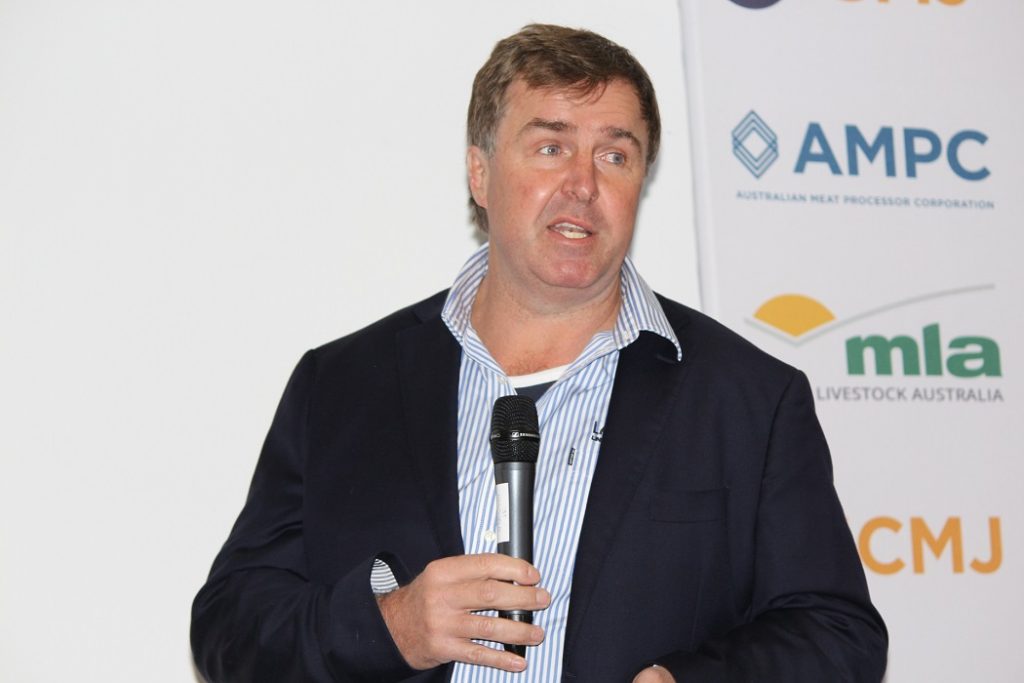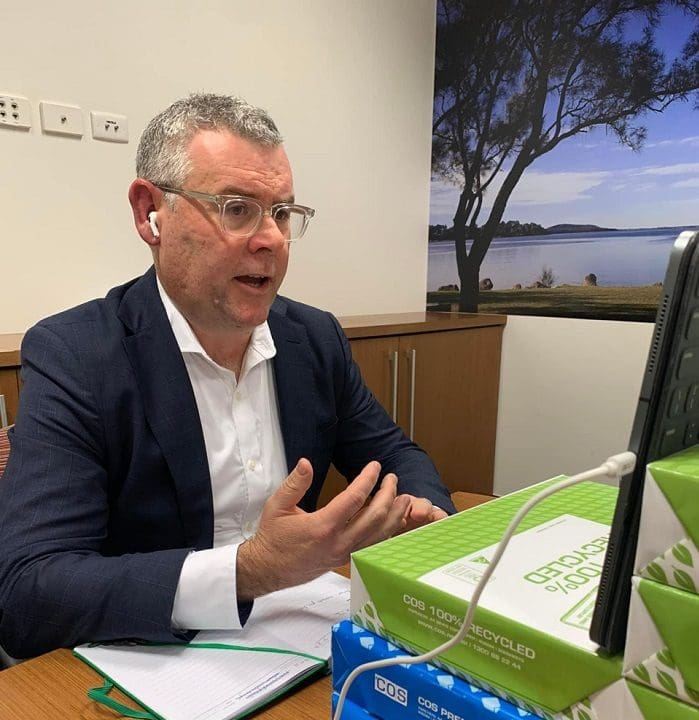
Sheep breeder Tom Bull at the 2022 ICMJ Conference at Wagga Wagga this week.
AUSTRALIA’S border security staff should be feted by the red meat industry to highlight the importance of their role in preventing an exotic disease incursion, a New South Wales sheep breeder said this week.
At the 2022 Intercollegiate Meat Judging Association’s annual conference in Wagga Wagga this week, NSW lamb seedstock producer Tom Bull said he had suggested the industry organize barbecues for border security workers.
“We’ve got to support the people at the frontline.
“Red meat producers need to show how important these people are to our future livelihoods,” he said.
Mr Bull said the FMD and LSD outbreaks in Indonesia and more recently FMD’s spread into Bali was a worry.
He heard an interview with a local woman returning from Bali on ABC Radio who said she wasn’t asked to complete a form on if she had been in contact with cows, there wasn’t any mention of FMD on the plane and she wasn’t asked to present her shoes on re-entering Australia.
“So the government has got to pull their finger out yesterday” on the biosecurity protocol for passengers returning from Bali “number one”.
On Wednesday morning, Mr Bull said he had suggested his idea to industry leaders to say “thank you” to border security and Department of Agriculture staff and inspectors.
“Let’s give them a barbecue, let’s try to thank them for all the work they are putting in.
“The reaction was very positive, but unfortunately we are not allowed to give them meat, we’re allowed to have barbecues,” he said.
“Let’s have barbecues, pat them on the back and make sure they know that there are 40,000-50,000 people in Australia that if they don’t do the right thing, they’re gone.
“I don’t think that link is there.”
Mr Bull said he had canvassed the idea with meat suppliers, who were supportive.
He said the industry feeling around an FMD is “a bit like the old Scomo hopes and prayers, you just hope it doesn’t come.”
“But my view is let’s try and do something.
“I put out a Facebook post last night, just warning about travelers to Bali and it’s had 4000 shares … you’ve just got to do whatever you can to try to get awareness,” he said.
“Because if no-one is telling the people coming in from Bali, there is a bit of a problem.”
Mr Bull said the Facebook post had now been shared 7000 times and it has had 700,000 views.
“What I am saying is rather than sitting there waiting for it (an FMD outbreak), what can you do as a farmer to try to help the cause.
“We need to treat out frontline AQIS workers like we did our medical staff in COVID,” he said.
Tougher biosecurity at airports

Minister For Agriculture Murray Watt during yesterday’s online biosecurity forum.
Minister for Agriculture Murray Watt yesterday convened a virtual meeting of about 80 farm, food and biosecurity leaders to share information on the status of the FMD outbreak in Indonesia, the government’s new biosecurity measures and to reaffirm its commitment to implementing any sensible measures to prevent an outbreak here.
He said he was also separately briefed by some of Australia’s leading biosecurity experts, including from CSIRO’s Australian Centre for Disease Preparedness, the Centre of Excellence for Biosecurity Risk Analysis and Australia’s chief veterinary officer, Dr Mark Schipp.
“At both briefings, I received valuable feedback and suggestions for additional measures and am now seeking departmental advice on them.
As of yesterday, biosecurity officers are boarding planes on arrival and playing a new biosecurity message on all inbound flights from Indonesia, reinforcing Australia’s strict biosecurity measures and providing FMD-specific advice to travellers, he said.
“This is a highly contagious animal disease that affects cloven-hoofed animals such as cattle, sheep, goats and pigs, and we must all take it seriously,” Mr Watt said.
“Travellers, farmers, governments and the general public have a shared responsibility when it comes to protecting Australia from an outbreak, which would have a significant impact on Australian agriculture and would cost the Australian people many billions of dollars.”
On Wednesday, Mr Watt announced measures in addition to other steps the Albanese Government had already put in place, including:
- New, targeted operations at major airports servicing travel from Indonesia to check a wider range of passengers who could be contaminated with FMD or be carrying contaminated goods, and assessment of all passengers on flights from Indonesia, with high risk passengers identified for intervention.
- The location of biosecurity detector dogs to Darwin and Cairns Airports;
- Additional signage and the distribution of flyers at major airports, informing travellers of FMD risk and precautions;
- Expanded social media campaigns, informing travellers of their biosecurity responsibilities,
- Additional training of airport biosecurity staff; and;
- Enhancement of mail profiling and inspections.
On Wednesday, the minister said the Albanese Government has ramped up tough biosecurity measures at the Australian border, in response to confirmation that FMD has reached Bali.
Following official confirmation from Indonesian authorities yesterday that FMD had spread to Bali, new measures were immediately imposed to protect Australia’s livestock industry from this threat, the minister said.
“These new measures build on additional measures the government had already put in place when the Indonesian outbreak first began.
“These existing strengthened measures include new targeted operations at major airports servicing travel from Indonesia to check a wider range of passengers who could be contaminated with FMD or be carrying contaminated goods and assessment of all passengers on flights from Indonesia, with high risk passengers identified for intervention,” he said.
New measures being taken or introduced include:
- The location of biosecurity detector dogs in Darwin and Cairns Airports,
- Additional signage and the distribution of flyers at major airports, informing travellers of FMD risk and precautions,
- Expanded social media campaigns, informing travellers of their biosecurity responsibilities,
- Additional training of airport biosecurity staff and,
- Enhancement of mail profiling and inspections.
Mr Watt said Australian biosecurity and particularly the threat posed by FMD is a top priority, and high level discussions have been occurring on an ongoing basis, between Australian and Indonesian authorities, as well as with local industry.
“I have received regular briefings about this issue since becoming minister and yesterday (Tuesday) I sought and received another urgent briefing about the latest developments from Australian director of biosecurity Andrew Metcalfe, the Australian chief veterinary officer Dr Mark Schipp, and head of the National Animal Disease Taskforce at the Department of Agriculture, Fisheries and Forestry, Dr Chris Parker.
“There are also well-established plans in place should FMD be detected in Australia, including an FMD vaccine bank,” he said.
“Indonesia will have the support of the Albanese Government in responding to their FMD outbreak.
“During his recent visit to Indonesia, Prime Minister Anthony Albanese committed Australian support, including vaccines and technical expertise, to respond to the recent outbreak of FMD. Indonesia has accepted Australia’s offer and we are progressing that support as a matter of urgency,” Mr Watt said.
“Biosecurity is a shared responsibility, and it is crucial that every traveller returning to Australia from areas affected by FMD follows the biosecurity instructions we have in place at the border.
“High risk materials cannot be brought into the country, including contaminated equipment or clothing, animals or animal products, such as meat products and cheese.”
For more information on FMD visit: www.agriculture.gov.au/footandmouthdisease

HAVE YOUR SAY